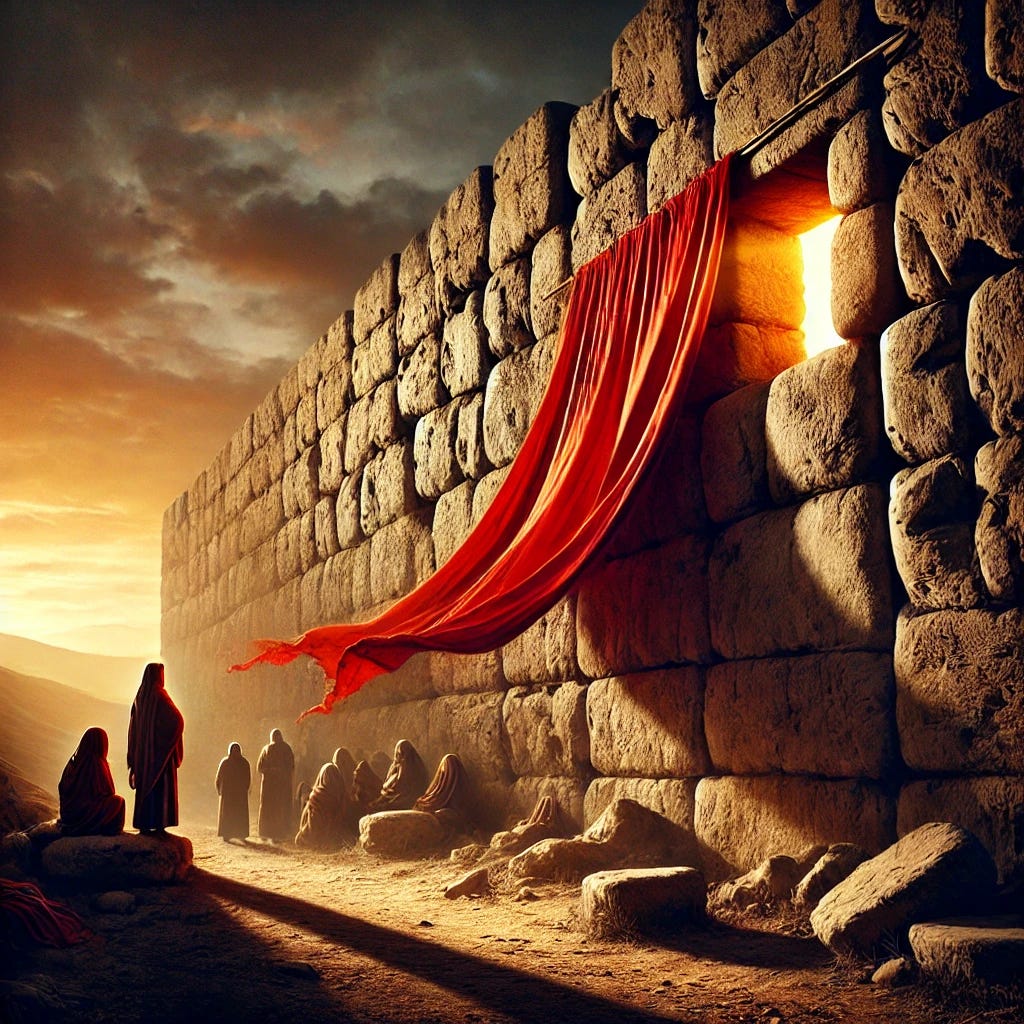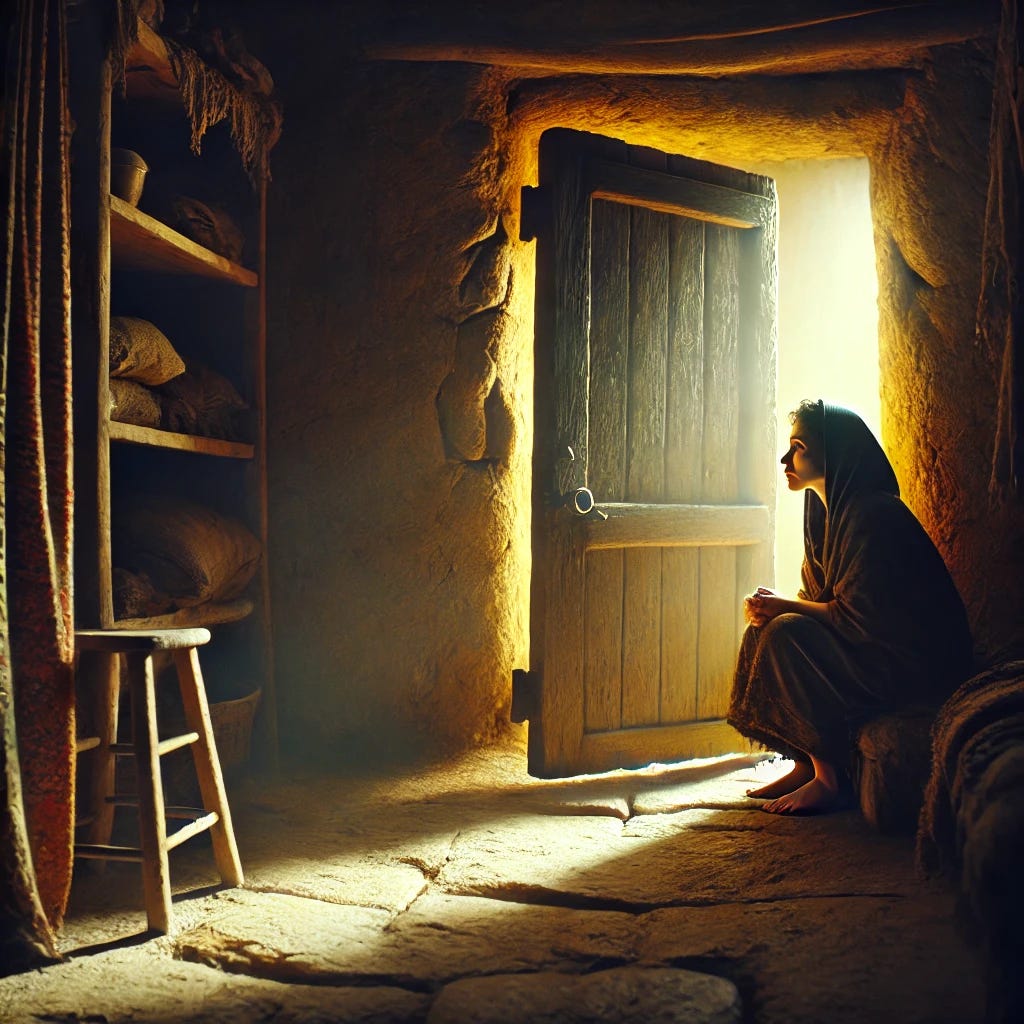Rahab’s story unfolds during the conquest of Canaan. Hers is a war story. She was a woman, a Gentile, a pagan, and a prostitute. In the ancient Near East, such a woman would have been seen as disreputable, reprehensible, and forbidden—a cultural shame, a family embarrassment, and a social monstrosity. Damaged goods.
Rahab was a secular, not sacred, prostitute. Cultic prostitution was spiritual in nature: the defilement of the body was offered as worship to demons. In contrast, a secular prostitute sold her body for material survival and economic necessity.
A person’s name carried significance in ancient times. Names were often snapshots of a person’s identity or destiny. The Semitic root of Rahab’s name means “broad, wide, or expansive”—a meaning likely tied to her occupation and suggestive of her reputation.1 The Theological Dictionary of the Old Testament (TDOT) notes that the etiological subtext of her name carried sexual connotations: “wide, open, generous, gratifying.”2 Scholar Martin Noth even suggests that Rahab’s name was originally associated with the word “brothel,” adding vivid imagery to her identity.3
In mythology, the name Rahab also symbolizes untamed, primordial chaos—everything contrary to God’s design and created order. The Babylonian creation myth, Enuma Elish, tells of the goddess Tiamat, the divine patron of salt water and mother of the gods. Disguised as a sea serpent, she went to war against Marduk, Babylon’s chief deity, but was defeated. Marduk used her broken body to create the universe.4 It's a myth of personification, conflict, and defeat.
In Hebrew usage, Rahab can also mean “pride” and “arrogance,” according to F. F. Bruce.5 All this meaning—this cultural, spiritual, mythological, and moral weight—is distilled into the life of one woman living in the Canaanite city of Jericho.
How would you feel if people viewed you as the embodiment of evil? As unredeemable. Worthless. Only useful for someone else’s gratification. Publicly accessible for sexual abuse and humiliation at another’s whim, with no protections, no boundaries, and no hope.
Rahab’s story intersects a pivotal moment in Israel’s history: their transition from oppressed slaves to free children of promise. From what was to what will be. From wanderers to possessors. From oppressed to conquerors. And Rahab finds herself on the losing side of a holy war.
The Old Testament depicts holy war as the dedication of people and objects to God. This was known as the “ban” (ḥērem in Hebrew), a divine order forbidding the violation of what was set apart to God. The Eerdmans Dictionary of the Bible explains the ban in Joshua 6 like this: “Thus Josh. 6–7 refers to a ban in which everything was to be killed, destroyed, or dedicated to God.”6
Its application varied. Sometimes it was voluntary (Numbers 21:2). Other times, commanded by God (Deuteronomy 20:17; Joshua 6:17–18). In certain battles, Israel was allowed to keep plunder (Josh. 8:2), while in others, everything was to be destroyed (Deuteronomy 13:15–17; 1 Samuel 15:3). Jericho fell into the latter category: total annihilation. Yet Rahab received a divine waiver. Why?
Rahab stands as both a surprising and controversial example of saving faith. We expect good people to be saved. We’re appalled when the unsavory—those we consider unworthy—find their way into the ark of salvation.
But Rahab acknowledged God’s power, plan, and promise. And then she did something even more remarkable: she waited. She waited for God’s promise to come to pass. Unlike our microwave generation of Christians, who want instant fulfillment without obedience, Rahab was a realist. Life had taught her not to trust easily. The world had used her up and thrown her away.
Then God showed up—knocking on her door, right in the middle of her pain, her mess, and her past. And he asked an impossible question: Do you trust me?
Imagine asking that of someone who had been used by everyone she’d ever known. Someone whose soul had been shattered into a million pieces. Someone with no reason to believe, no reason to hope.
But that’s what God asked. And that’s what God still asks: a choice. A sacrifice. A dramatic surrender. In one encounter, Rahab was asked to trust God more than her fear. To believe. To hope. To embrace his future over her past. To gain everything, she had to release the little she still held. There was no safety net. No plan B. It was all or nothing.
And Rahab risked everything—not just her life, but the lives of her entire family. Both the king of Jericho and the King of heaven had issued death sentences for betrayal. But only one of those choices carried eternal consequences.
To remain an unforgiven harlot and enemy of God would lead to a spiritual death more devastating than anything Jericho’s king could threaten. Rahab’s soul cried out for something more—real love, lasting acceptance, and divine deliverance. And when God offered it, she dared to believe.
There’s a modern proverb: “Blood is thicker than water,” meaning family bonds outweigh all others. But in Rahab’s case, faith was thicker than water. She chose God over her king, her culture, her livelihood—even her family. And because of that choice, one life saved became many lives saved.
Her story proves the theological truth: the only life spared is the life surrendered.
Rahab was saved. So was her family. Her human story collided with God's eternal story. She must have wondered if anything good could come from her life. But God knew it could. She became the ancestor of Ruth, King David, and Jesus himself. Her name is listed in the hall of faith.
God re-wrote her story. What once described a woman exploited and exposed became the defining mark of a redeemed heart. No longer “wide open” to abuse and humiliation, Rahab became open to faith. Her name—once a symbol of shame—was redefined by grace. She displayed a heart wide enough to believe God, open enough to welcome the spies, and generous enough to risk everything to save others. In God’s hands, her story—and even her name—was transformed. What had once signaled moral ruin now reflected spiritual openness and expansive faith.
Rahab’s story reminds us: when God delivers us, he grafts us into something bigger than ourselves. Simple faith—offered sincerely—can ripple through generations in ways we’ll never fully understand.
R. Bartelmus, “רָחַב,” In the Theological Dictionary of the Old Testament (TDOT), edited by G. Johannes Botterweck, Helmer Ringgren, and Heinz-Josef Fabry, translated by David E. Green, rev. ed., v. 13 (Grand Rapids, MI: Eerdmans Publishing Company, 2004), 427.
TDOT, v. 13, 430.
TDOT, v. 13, 430.
Victor H. Matthews and Don C. Benjamin, Old Testament Parallels: Laws and Stories from the Ancient Near East, 4th ed., (Mahwah, NJ: Paulist Press, 2016), 21–31.
F.F. Bruce, “Rahab,” In the New Bible Dictionary, edited by D. R. W. Wood, I. H. Marshall, A. R. Millard, J. I. Packer, and D. J. Wiseman, 3rd ed. (Downers Grove, IL: InterVarsity Press, 1996), 999.
Joel S. Kaminsky, “Ban,” In the Eerdmans Dictionary of the Bible, edited by David Noel Freedman, Allen C. Myers, and Astrid B. Beck (Grand Rapids, MI: Eerdmans Publishing Company, 2000), 146.






